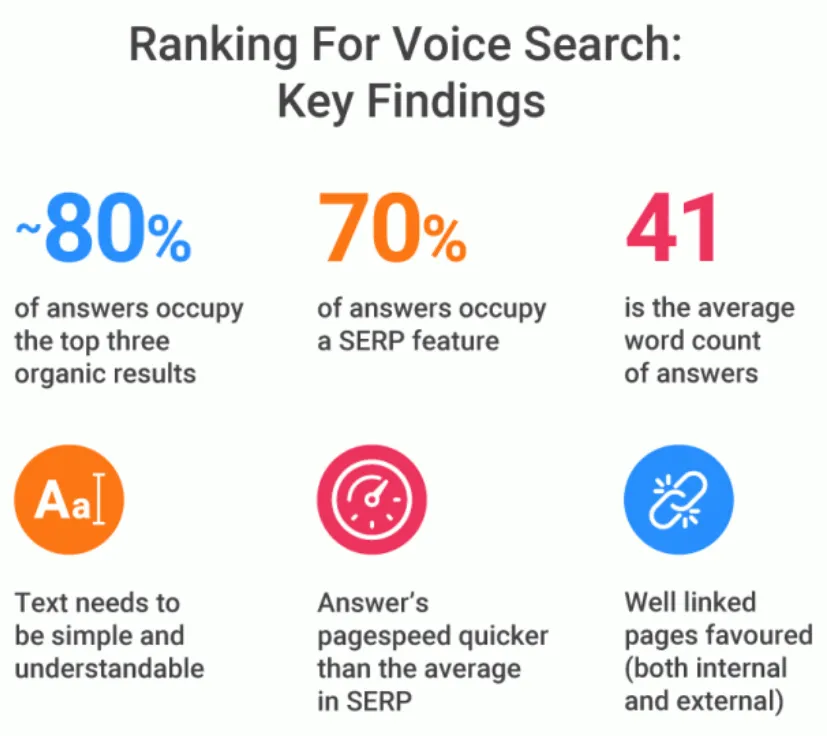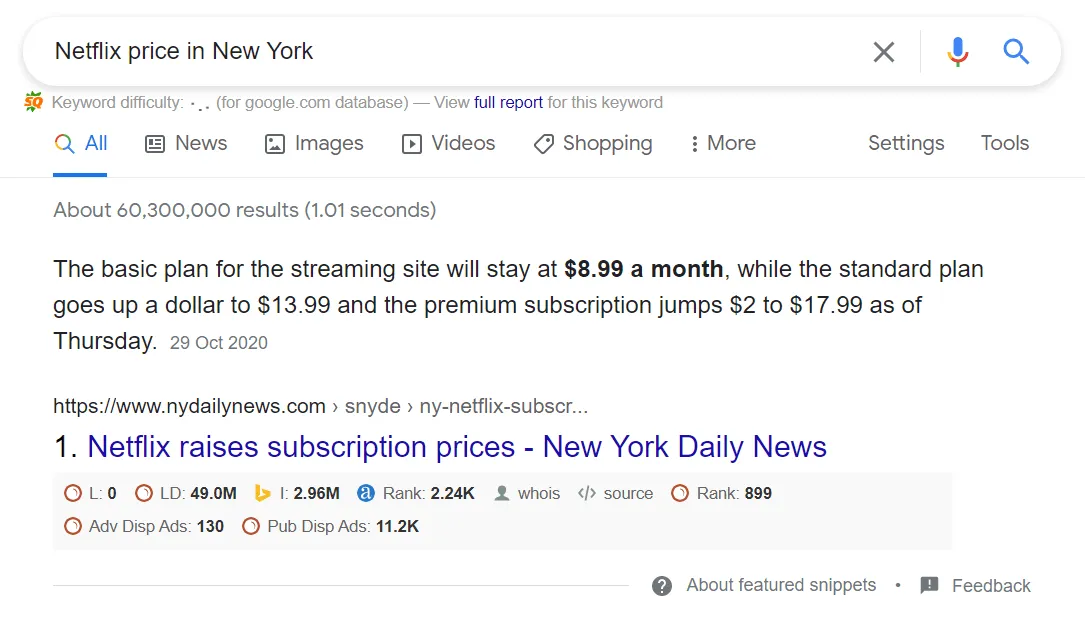
Voice Search Optimization: What is it and its Importance?
Voice search is not fading anytime soon. The technology was once incepted as a concept and now powers 20-25% of search queries.
But still, we are likely to have some questions like:
- Is voice search optimization crucial for business?
- Are people using voice search to engage with businesses or for purchases?
Here’s an interesting stat reported by SEMrush.
![]()
To answer these questions, let us check some statistics:
- According to an SEO trends report, voice search is the third most important SEO trend today.
![]()
- Sales through voice search technology have surpassed the $2 billion mark. And 43% of consumers use their voice-enabled devices for online shopping.
- Ecommerce brands that adopted voice search can expect a 30% growth in revenue by the end of 2021.
- 58% of users in the US have been utilizing voice search to find local businesses.
There are still more stats proving the capabilities of voice search. However, by now, we know that voice search optimization is critical to your SEO efforts.
So, as we walk down the article, we will learn what voice search optimization is. Moreover, we will shed light on the best tips to optimize your site for voice search.
What is Voice Search Optimization?
It refers to the practice of making webpages rank for voice search queries. It includes a series of steps to increase your content’s relevancy for voice search. Now, if you optimize your content for the voice search, then the voice search device can:
- Read your content out loud to the searcher; or
- Offer you the most relevant search results on your screen.
Voice search technology analyses the semantic relevancy of your query. It utilizes Natural Language Processing (NLP) along with wider contextual meaning. For every query, Google understands the intent, texture, interest, and behavior. And it delivers the best results accordingly.
Voice search employs artificial intelligence, and it becomes smarter with every new search.
Voice search focusses on conversational words instead of long-tail keywords:
For text search, we use shorter keywords that help us find results most shortly. For example, if we wish to search for the next India vs. Australia cricket match, we would type: “In vs. Aus next cricket match.”
On the other end, when we make a voice search query, we use a conversational tone. For example, our voice search query would be: “When is the next India vs. Australia match?”
It’s because voice search is made with a naturally spoken language.
 Our voice search query is generally longer than the text search query. However, do not equate it with long-tail keywords. Instead, it is more likely to contain question phrases.
Our voice search query is generally longer than the text search query. However, do not equate it with long-tail keywords. Instead, it is more likely to contain question phrases.
Therefore, you need to understand how people talk about your brand and offerings. The language and phrases they use, and what are their most common queries. You can also increase the relevancy through LSI keywords.
And one can easily find tools that offer you the most relatable question phrases for a keyword. One such tool is Answer the Public. You can use the results (question phrases) from this tool to sort relatable keywords. Adding these keywords to your content grows its relevancy for voice searches.
Tips to Optimize Your Website for Voice SEO
1. Grow Relevancy for Conversational Queries
As aforementioned, voice search differs from text-based search. For example, when you wish to learn PPC, you might search “PPC tutorial” on Google. And the result is videos followed the informational pages.
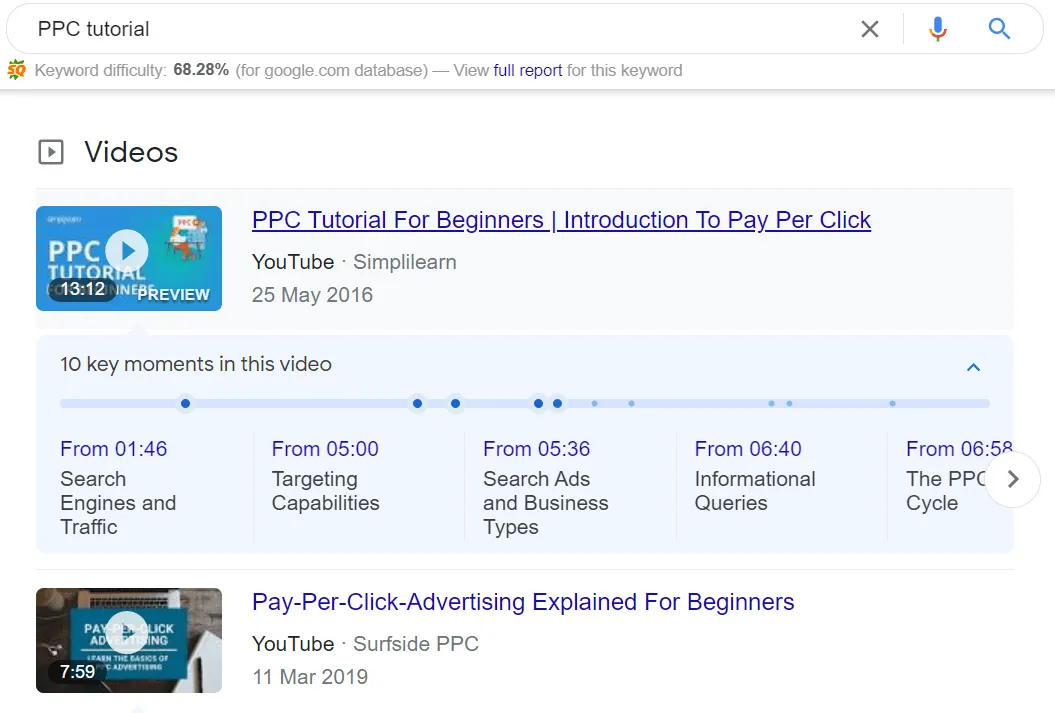 But, when you do a voice search, your query might be: “How do I do PPC?” One might also search, “How can I learn PPC?”
But, when you do a voice search, your query might be: “How do I do PPC?” One might also search, “How can I learn PPC?”
These voice search queries have a conversational tone as if talking with a human. So, even search engines try to answer them in a conversational tone itself.
 And both the text-based and voice search queries might offer you different results.
And both the text-based and voice search queries might offer you different results.
So, to rank your pages for the voice search, you must incorporate conversational keywords. A significant volume of these conversational keywords includes question phrases.
You can attract qualified traffic by optimizing for more actionable question phrases. The queries, including “Who” or “How,” are generally in the initial research phase. You can include these question phrases in your informational content.
More actionable question phrases include “Where.” These phrases hint at a direct, actionable intent and can result in sales or conversions. Try to add these phrases and quick answers to them in your content.
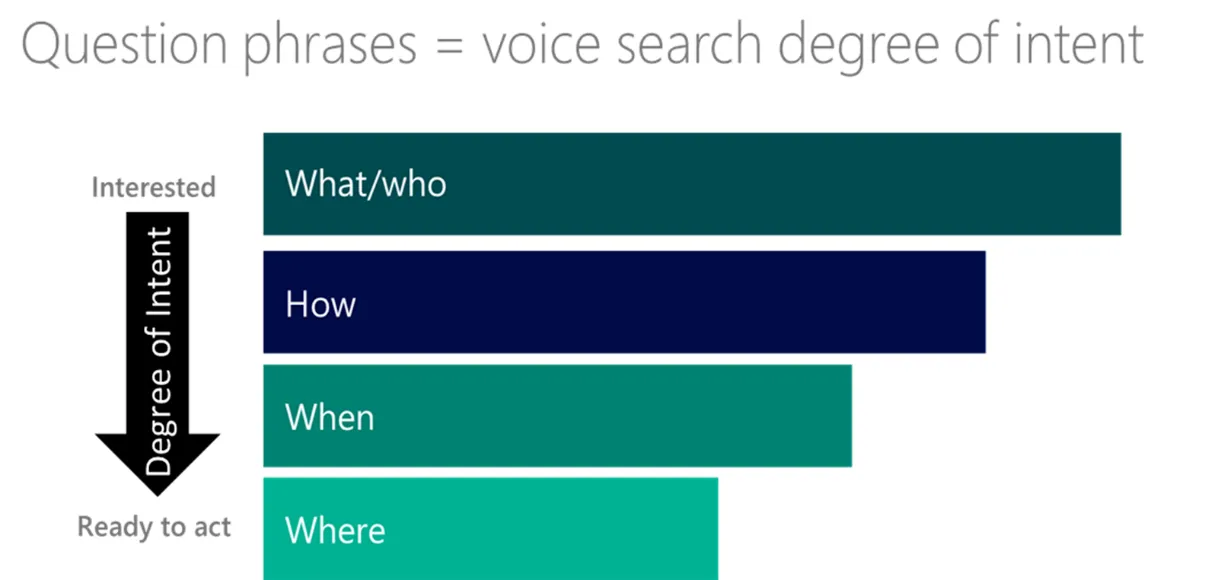 To find questions related to your focus keywords, you can:
To find questions related to your focus keywords, you can:
- Use Google Analytics to see common queries people are using to land on your content.
- Use People Also Ask section on Google to sort some most common queries.
- Employ tools like Wordtracker Scout and Answer the Public.
2. Try to Offer Quick Answers
Use Google Analytics to assess the keywords people are using to find your pages. Review user-generated content related to your products and services. And figure out the most common queries people might use for your offerings. Try to include precise and straightforward answers to these queries in your content. The common queries can be related to-
- Opening hours of your business;
- The address of your store;
- The pricing of your tool;
The voice search AI finds the exact conversational phrase answers and presents them in the SERP.
![]()
- Whether you offer a specific product.
For example:
When a user searches your store timings, Google could easily find the answer on your site. Place these answers in simple HTML texts instead of images. And place them at the most obvious spots on your site. Make sure the search crawlers can find it easily or with the least effort.
Proper optimization will allow the voice device to read your result out loud to the user. Or the mobile device will deliver a quick answer to the user on the screen. It enhances the user experience, and users can take further actions on the search results.
3. Employ Schema Metadata
Your goal is to help search engines understand the site content with ease. And one of the strategies to accomplish this goal is by using schema markup.
Schema markup is a way to add structured data or metadata to the site’s HTML. This markup helps you to add more information elements to the site. Only search engine crawlers can read the schema data, and users cannot view it. SEOs also use schema markup to form rich snippets.
Schema markup does not have a direct impact on your site rankings. However, it grows your site’s visibility for voice searches as well as text searches.
You can add answers to common queries through schema markup. For example, you can create schema markup for information like:
- Opening hours of the store
- Recipes for your dish offerings
- Your physical store address
- Your contact information
so it’s cataloged and appears on top for voice searches
![]()
- The pricing of your popular products
When a user enters these queries, Google can easily retrieve information from the schema. Schema markup allows crawlers to classify important information and use it as quick results.
It is advisable to use a sitemap along with schema markup. And make sure you follow the right robots.txt directives.
4. Optimize your GMB Listings
As aforementioned, the highest number of queries through voice search are local searches. And a significant number of these searches have actionable intent. As per a report, 50% of local searches through mobile devices lead to store visits within a day.
It means that voice searches are crucial when you are targeting local sales or store visits. And so, you need to optimize your GMB listings and local listings.
When you optimize for local keywords, your site can rank for location-specific queries. For example, when a user searches “best Italian food in Perth,” your site may trigger.
Perform in-depth local competitor analysis and leverage it to enhance your GMB page.
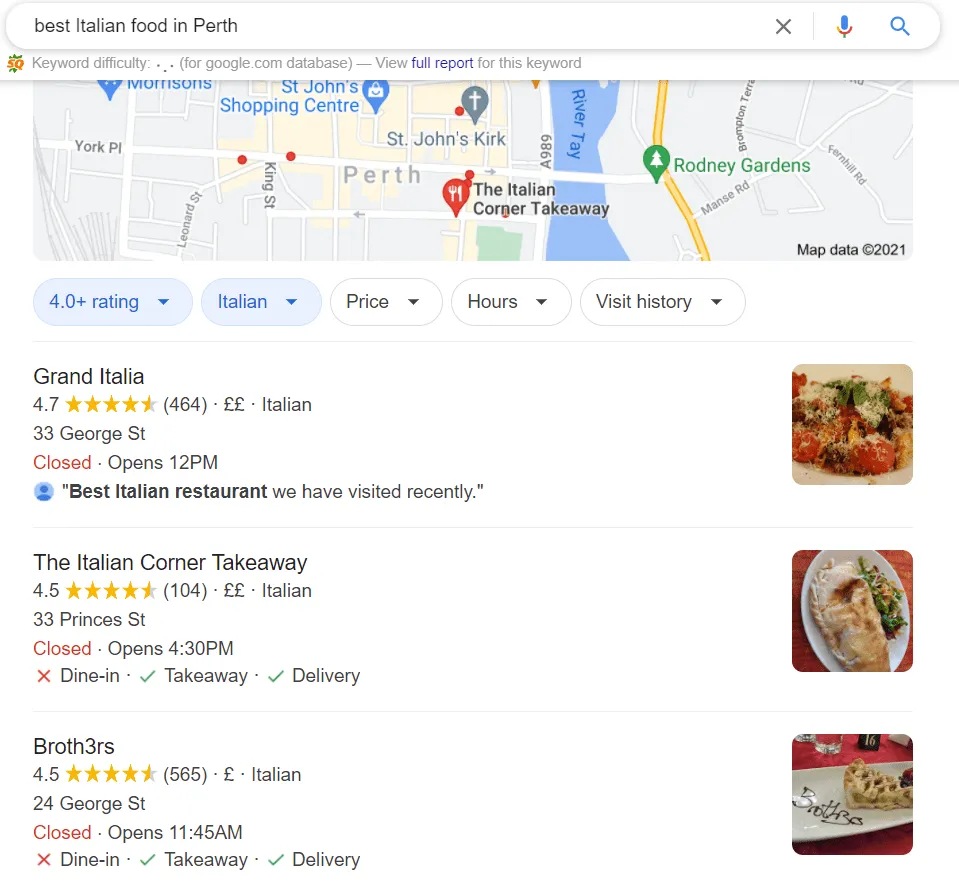 When a user does a voice search for the “near me” keyword, GMB listing is crucial. Your GMB listing allows you to rank for the local 3-pack results. And Google tries to sources the best results from local 3-pack for hyper-local voice searches.
When a user does a voice search for the “near me” keyword, GMB listing is crucial. Your GMB listing allows you to rank for the local 3-pack results. And Google tries to sources the best results from local 3-pack for hyper-local voice searches.
For example, if a user searches “best Italian food near me,” Google will refer to GMB data. Therefore, your GMB presence helps you appear for local voice searches. To optimize your GMB, take specific steps like:
- Add NAP (name, address, phone No.) details consistently across various listings.
- Choose the right business category. For example: “Hair Saloon,” “Chinese Restaurant,” etc.
- Create a detailed and proper description of your business with important details
- Add high-quality images and videos of your business.
- Make sure your information is consistent across local directories.
Make sure you add your important business information on your website as well. Many businesses add contact, directions, and address information to the site footer. It helps the crawlers and users find this information with ease.
5. Gear up for the Coveted Position ‘Zero’
Voice search sources 50% of search results from the featured snippet section. It helps search engines get direct answers to voice search queries in the fastest way. So, optimizing for the position ‘zero’ can help you grow visibility for voice search queries.
When I voice searched for “diabetic levels,” the zeroth position was bagged by the voice search optimized page.
 So, how can you gear up for the position ‘zero’ or featured snippet?
So, how can you gear up for the position ‘zero’ or featured snippet?
There are several tips to optimize for a featured snippet. These include:
- Creating structured content with the proper use of the title, header tags, bullet points, etc.
- Creating crisp content to answer certain common queries directly
- Creating a FAQ section to rank as the featured snippet for direct queries.
6. Make your Website Mobile-friendly
Mobile devices powers the majority of voice search queries. Moreover, 50% of all smartphone users leverage voice search technology. With that said, you cannot win for voice search without a mobile-friendly website.
An interesting stat shows the importance of having a mobile-friendly website to leverage voice search results for business growth.
 It is advisable to make your website responsive for voice search optimization. A good option is to test your site on Google’s Mobile-Friendly Test Tool. It will tell you whether your webpages are mobile-friendly or need optimization. If your website is not mobile-friendly, the tool will offer you specific tips to do so.
It is advisable to make your website responsive for voice search optimization. A good option is to test your site on Google’s Mobile-Friendly Test Tool. It will tell you whether your webpages are mobile-friendly or need optimization. If your website is not mobile-friendly, the tool will offer you specific tips to do so.
Moreover, mobile-friendliness is an important ranking factor for general search results. So, if your website is not responsive, your SEO efforts are not likely to serve you well.
An important tip is to prepare your content such that it is easily readable on mobile devices. When users scroll through your content, they should easily understand the crux of it.
7. Improve your Site Speed for Voice Search
An average voice search result loads in 4.6 seconds, and it is 52% faster than the average page load speed.
Now when a user performs voice search, search engines try to retrieve a result faster. And therefore, it expects a site to load more quickly if it wishes to rank for voice search. Thus, a crucial part of voice search optimization is improving site speed.
If a website’s site speed is more than 4 seconds, then it’s most likely that it loses a position (rank) from the SERPs.
 You can use various site speed checking tools to get your site speed score. Make sure your site speed score is above average on both web and mobile platforms.
You can use various site speed checking tools to get your site speed score. Make sure your site speed score is above average on both web and mobile platforms.
A site audit will indicate to you the elements that are fading your site performance. You need to fix them with the help of your developer. Your site speed has a considerable impact on both your voice search and text search SEO.
8. Answer Common Queries from your Target Audience
Common queries about your business form most of the important voice searches for you. You need to study these common queries and answer them in your content.
Create FAQ pages to cover all these common queries and offer crisp answers to them. Ensure that you have covered each voice search-worthy query or concept in your FAQs.
 And it is advisable to go a step ahead by producing dedicated blog posts for these queries.
And it is advisable to go a step ahead by producing dedicated blog posts for these queries.
Use precisely structured content for these dedicated guest posts. Several businesses gain good traffic and conversions from blogs about common queries.
These can be simple and popular queries like:
- What is the price of a certain tool?
- Which company is the best web hosting provider?
- Where can I find the best subscription plan for a certain platform?
- Who would be the right PPC consultant for my company in California?
You must also know the dialect and question phrases your target audience uses. Include these in your content to make it relevant for related voice search queries.
9. Build Target Persona and Comprehend Your Customers’ Behaviour
Artificial intelligence technology forms the basis of the voice search algorithm. And this algorithm learns with each conversation. Moreover, it collects information from various data points and the user’s location.
Relevant: Artificial Intelligence on Ecommerce
It would help if you analyzed real-time insights into the behavior of your target audience. And you need to research their interests, location, and queries. Based on these parameters, you can prepare the buyer persona and optimize further.
You might also need to understand the voice-enabled device your customers use. It will help you optimize for the right device and proper search behavior.
10. Expand your Visibility with Intent-based Keywords
Except for the question phrases, you must optimize the content for contextual searches. Try to research the intent-based keywords related to your business and offerings. And use these in your content to rank for relevant voice search intent.
Most voice search queries are longer than general text-based queries. And some voice search queries include long-tail keywords related to your business. Therefore, it is better to research and use abounding long-tail keywords in your content.
Moreover, you can grow your visibility by appearing for semantic searches. To optimize for these searches, you need to add LSI keywords to your pages. One can easily find LSI keywords using Google Autocomplete and other LSI tools.
Now, the voice search algorithm learns accent and intent better with each new search. By adding long-tail and LSI keywords, the intent of your content becomes clearer. And so, your webpages are visible for specific-intent searches. You can also expect quality traffic on your site through this effort.
Voice Search Optimization FAQs
1. How can I optimize my website for voice search?
Voice search optimization includes a series of steps, these include:
- Understand the conversational tone and keywords and add them to your content
- Voice search queries include question phrases. Research relevant question phrases and add them to your page content.
- Add important schema markup to your website. It helps crawlers to find important information about your business easily. It includes opening hours, pricing, address, etc.
- You need to optimize your content to rank for position ‘zero’ (featured snippet).
- Improve the detailing and accuracy of your GMB listing. Establish consistency over your local listings with proper information. Add conversational description, precise contact details, images, and FAQs in GMB to be noticed by voice search signals.
![]()
- Make your website mobile-friendly, as a majority of voice searches are via mobile devices.
- Improve the speed of your website for both mobile and web platform
- Try to answer the common queries directly through FAQ pages and crisp content.
- Along with conversational keywords, include long-tail keywords in your site content.
2. What would be the future trends for voice search optimization?
Voice search is increasing, and the technology is already catering to a huge no. of queries. As it grows, various voice search optimization trends are rising alongside. Some of the future voice search SEO trends are:
- As the sales of voice speakers grow, conversational and readable content will take the lead. fast-paced growth of smart speakers each year (also considering the growth of podcasts and webinars) represents that voice search will be a key aspect.
![]()
- The use of voice assistants is growing, and it will significantly impact local search SEO
- More and more millennials are using voice search for making online purchases. And so, voice search is becoming a major ecommerce optimization trend.
- 50% of smartphone users already use voice search, and this percentage is surging. So, you must ensure that your site is responsive and loads fast on the mobile platform.
- More consumers will use voice search to find about businesses in the coming years. And voice search optimization will become a must-have SEO strategy.
3. What do you mean by voice search optimization?
Akin to SEO, voice search works based on an algorithm and ranking factors. The practice of optimizing for these ranking factors and algorithm is voice search SEO. It is about delivering crisp, authentic, and quick results to a user’s voice search query.
The search engines should find your content as the best result to a user’s voice query. Such that a voice device can read out your content out loud or display it on its screen.
Voice search SEO also requires optimizing the context and relevancy of your content. With this, your pages should be responsive and load faster.
4. What is the working concept behind voice search SEO?
When a user asks his query on a voice-enabled device, the device captures the query. Then the voice algorithm analyses the keywords, context, and accent of the query. Based on this analysis, the algorithm retrieves the result from the search engine database.
The voice algorithm utilizes Natural Language Processing and AI to understand the query. The voice device then reads the result out loud or displays it on the device’s screen.
The search and results through AI and NLP flow as shown here.
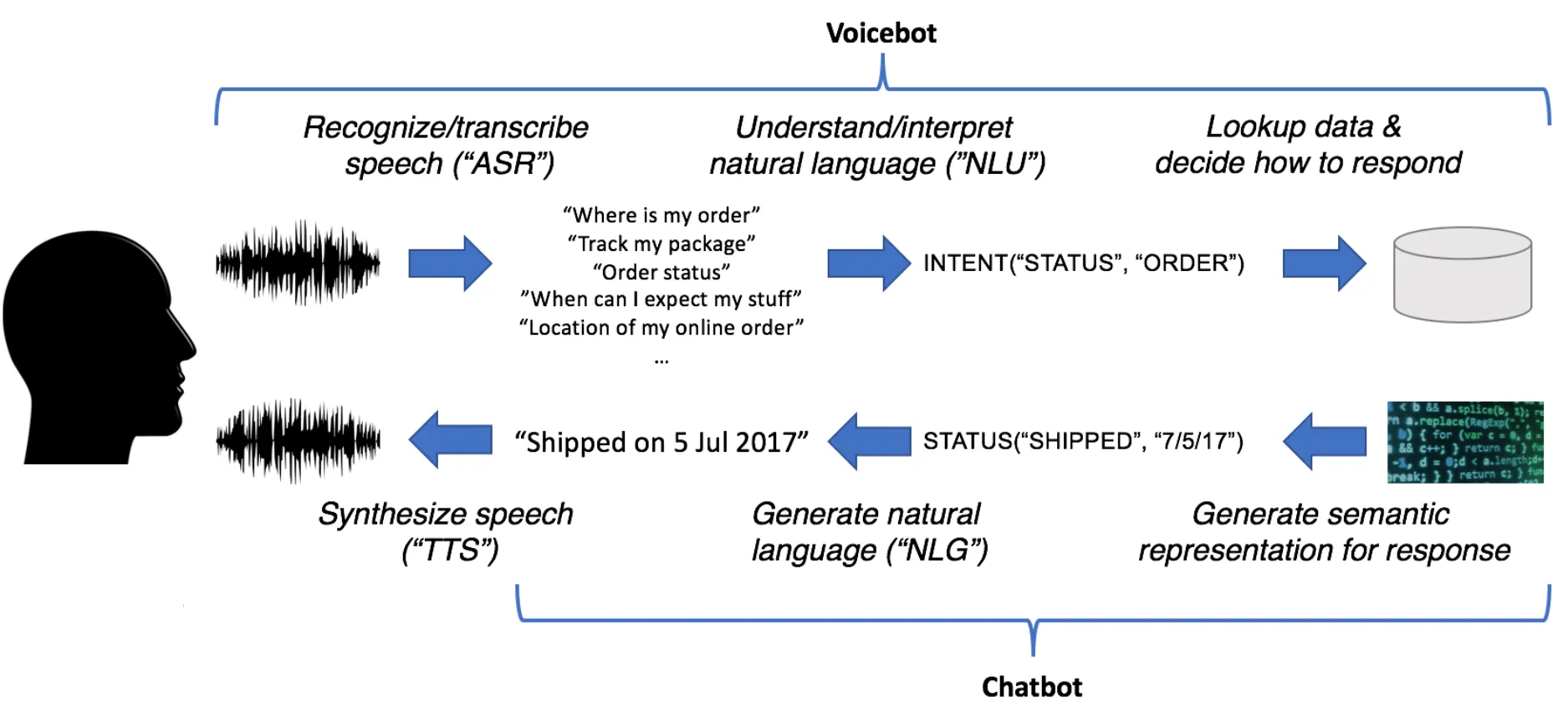 Also, post the Google BERT update, the scope for producing the intent-worthy content has increased to understand the user’s intent.
Also, post the Google BERT update, the scope for producing the intent-worthy content has increased to understand the user’s intent.
Now, to appear as a result of voice searches, you need to make certain optimizations. These optimizations make your content visible to the voice search algorithm.
5. Why is voice search optimization essential for a business?
Within the past couple of years, voice search has become an important part of our lifestyle. And a significant percentage of your potential customers now use voice search. So, unless you optimize for voice search, you are likely to miss out on those customers. Here are more reasons why you must consider voice search SEO crucial for your business:
- 45% of millennials said that they made a purchase using voice search in 2019.
- 58% of consumers in the US have been using voice technology to search about a business.
- 55% of voice search users are using the technology to inquire about local businesses.
- Approximately 40% of US internet users used voice search technology in 2020.
- Some estimate that smart speaker sales will surpass tablet sales shortly.
6. Can voice search optimization help me grow my business revenue?
Voice search has become a mainstream way how people access the internet. People today not only use voice commands to find products but even purchase them. Voice search optimization helps you grow the visibility of your business online. Here are some stats that display how voice search can impact your business revenue:
It’s expected that businesses who deploy voice search optimization will reap 30% more revenue than those who don’t.
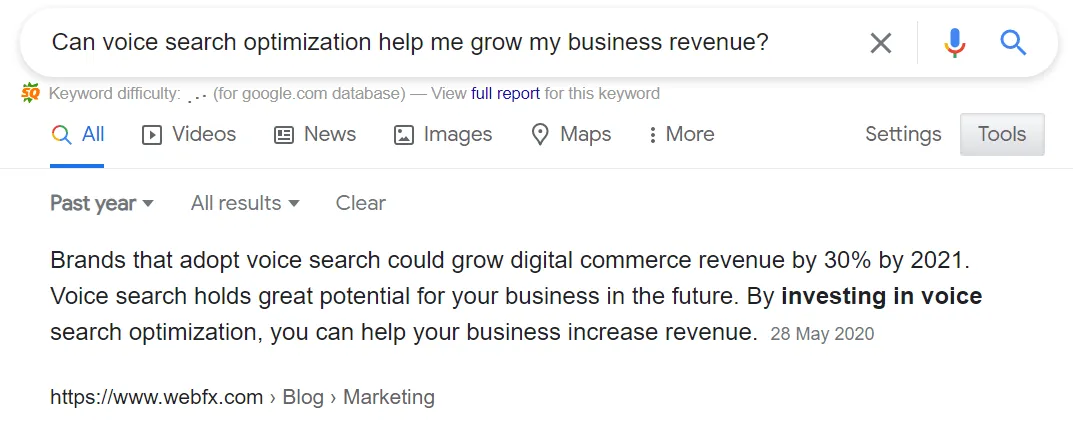
- Marketers expect shopping through voice search to reach $40 billion by the end of 2022.
- Over 17.2 million people made purchases using voice commands in 2018.
- Ecommerce businesses that employ voice search SEO can expect a 30% growth in sales in 2021.
- Shopping through voice search was worth $2 billion in 2017.
7. What are the 4 best voice search optimization tips?
There are several ways to optimize for voice search SEO. The most important tactics include:
- Optimize for conversational search queries : Voice search queries are conversational. To optimize for these queries, analyze and add conversation phrases to the content. Also, add question phrases and long-tail keywords related to your offerings.
- Add structured data to offer quick answers : The voice search algorithm tries to retrieve quick answers to a user’s query. You can use schema markup to add important data about your business as quick answers. Also, use structured content that can rank as the featured snippet.
- Improve local search presence : A huge no. of voice searches are local search queries. To appear for these queries, you need to optimize your GMB profile. Also, list your business on popular local listings with proper (and consistent) information.
- Optimize the website’s performance and responsiveness : Make sure your website is responsive and works efficiently on the mobile platform. Also, improve the speed of your website.
Summing Up
Voice search optimization will soon become a requisite part of every SEO strategy. Already a significant amount of users are using voice search to learn about a business. And this trend will have a substantial impact on sales and conversions shortly. It also means that voice search optimization will become an important ranking factor.
Smart speakers in coordination with mobile devices will increase the voice shopping market. And ecommerce businesses will implement new voice search SEO directives.
A majority of voice search queries are about local businesses. And the technology will continue to influence the way users do local searches. It means that local businesses will lose a good amount of prospects if they fail to optimize voice searches.
So, if you haven’t already optimized for voice searches, start before your competitor outperforms you. The 10 best voice search optimization tips listed above will surely help you rank better.
Further, you may like to consult our experts about voice search SEO or hire them as your SEO execution partners. Feel free to connect with us today.
ABOUT THE AUTHOR:
Joseph Schneider

He has spent more than 12 Years in strategising and executing SEO campaigns. He is interested to writing Digital-marketing, PPC and Social Media Marketing related topics.
Related Post
Best Wordpress SEO Plugins And Benefits
Measure The Performance Of Your SEO
Keyword Research Mistakes In SEO
Bad SEO On Business Reputation
Reduce Customer Acquisition Cost SEO
Artificial Intelligence And SEO
All In One SEO Plugin Features
Web Design Mistakes That Affect SEO
SEO Before After Website Launch
How To Get Google Ads Certifications
SEO Friendly Website Design Strategies
How To Get Google Analytics Certification
ABOUT THE AUTHOR:
Joseph Schneider

He has spent more than 12 Years in strategising and executing SEO campaigns. He is interested to writing Digital-marketing, PPC and Social Media Marketing related topics.
Related Post
Best Wordpress SEO Plugins And Benefits
Measure The Performance Of Your SEO
Keyword Research Mistakes In SEO
Bad SEO On Business Reputation
Reduce Customer Acquisition Cost SEO
Artificial Intelligence And SEO
All In One SEO Plugin Features
Web Design Mistakes That Affect SEO
SEO Before After Website Launch
How To Get Google Ads Certifications
SEO Friendly Website Design Strategies
How To Get Google Analytics Certification
